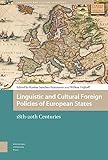Linguistic and Cultural Foreign Policies of European States : 18th-20th Centuries / ed. by Willem Frijhoff, Karène Sanchez-Summerer.
Material type: TextSeries: Languages and culture in history ; 3Publisher: Amsterdam : Amsterdam University Press, [2016]Copyright date: 2016Description: 1 online resource (200 p.) : 6 halftonesContent type:
TextSeries: Languages and culture in history ; 3Publisher: Amsterdam : Amsterdam University Press, [2016]Copyright date: 2016Description: 1 online resource (200 p.) : 6 halftonesContent type: - 9789048529995
- 327.4
- JZ1570 .L56 2017
- online - DeGruyter
| Item type | Current library | Call number | URL | Status | Notes | Barcode | |
|---|---|---|---|---|---|---|---|
 eBook
eBook
|
Biblioteca "Angelicum" Pont. Univ. S.Tommaso d'Aquino Nuvola online | online - DeGruyter (Browse shelf(Opens below)) | Online access | Not for loan (Accesso limitato) | Accesso per gli utenti autorizzati / Access for authorized users | (dgr)9789048529995 |
Frontmatter -- Table of Contents -- Introduction -- 1. External linguistic politics and policies in the German-speaking countries of Central Europe in early modern times and in the nineteenth century. With some references to the present age -- 2. German global soft power, 1700–1920 -- 3. French as a polemical language for Russian writers in the age of Nicholas I -- 4. The external cultural and linguistic policy of the Italian government in the Mediterranean region and the issue of the National Association for Aid to Missionaries (1886–1905) -- 5. Expansion du français et des manières françaises en Europe aux dix-septième et dix-huitième siècles. Résultat d’une politique royale extérieure ou effet d’un certain prestige? -- 6. Literary translation as a foreign language policy tool. The case of Russia, mid-eighteenth – early nineteenth centuries -- 7. L’usage diplomatique de la langue française, instrument de la puissance? -- 8. The political implications of the idea of génie de la langue in the seventeenth and eighteenth centuries -- Index
restricted access online access with authorization star
http://purl.org/coar/access_right/c_16ec
The policies relating to language pursued by European monarchies and states have been widely studied, but far less attention has been given to their linguistic and cultural policies in territories outside their own borders. This volume takes an interdisciplinary approach to filling that gap, distinguishing and analysing several different types of linguistic and foreign cultural policies. Such policies, the contributors show, tended not to be proclaimed officially, but they nonetheless had lasting effects on both language and culture in Europe and beyond.
Mode of access: Internet via World Wide Web.
In English.
Description based on online resource; title from PDF title page (publisher's Web site, viewed 26. Aug 2024)


